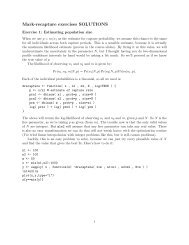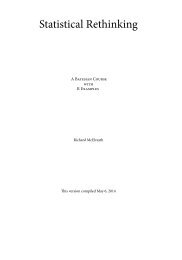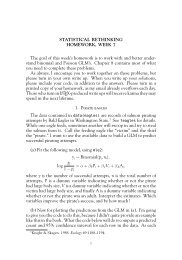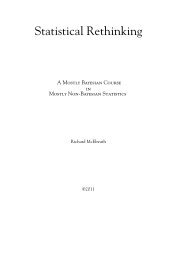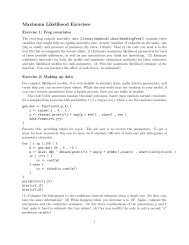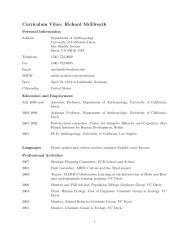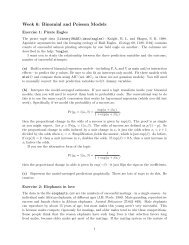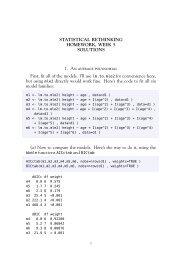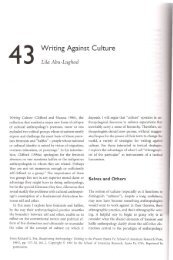the relation of habitual thought and behavior to language
the relation of habitual thought and behavior to language
the relation of habitual thought and behavior to language
Create successful ePaper yourself
Turn your PDF publications into a flip-book with our unique Google optimized e-Paper software.
RELATION OF HABITUAL THOUGHT AND BEHAVIOR TO LANGUAGE .<br />
is a <strong>relation</strong> between a <strong>language</strong> <strong>and</strong> <strong>the</strong><br />
rest <strong>of</strong> <strong>the</strong> culture <strong>of</strong> <strong>the</strong> society which<br />
uses it. There are cases where <strong>the</strong> `fashions<br />
<strong>of</strong> speaking' are closely integrated with <strong>the</strong><br />
whole general culture, whe<strong>the</strong>r or not this<br />
be universally true, <strong>and</strong> <strong>the</strong>re are connections<br />
within this integration, between <strong>the</strong><br />
kind <strong>of</strong> linguistic analyses employed <strong>and</strong><br />
various <strong>behavior</strong>al reactions <strong>and</strong> also <strong>the</strong><br />
shapes taken by various cultural developments.<br />
Thus <strong>the</strong> importance <strong>of</strong> Crier<br />
Chiefs does have a connection, not with<br />
tenselessness itself, but with a system <strong>of</strong><br />
<strong>thought</strong> in which categories different from<br />
our tenses are natural. These connections<br />
are <strong>to</strong> be found not so much by focusing<br />
attention on <strong>the</strong> typical rubrics <strong>of</strong> linguistic,<br />
ethnographic, or sociological description<br />
as by examining <strong>the</strong> culture <strong>and</strong><br />
<strong>the</strong> <strong>language</strong> (always <strong>and</strong> only when <strong>the</strong><br />
two have been <strong>to</strong>ge<strong>the</strong>r his<strong>to</strong>rically for a<br />
considerable time) as a whole in which<br />
concatenations that run across <strong>the</strong>se departmental<br />
lines may be expected <strong>to</strong> exist,<br />
<strong>and</strong> if <strong>the</strong>y do exist, eventually <strong>to</strong> be discoverable<br />
by study .<br />
A NOTE ON WORD-MAGIC<br />
[Joseph, speaking <strong>of</strong> a lion .] `But if he had come, with lashing tail,<br />
<strong>and</strong> roared after his prey, like <strong>the</strong> voice <strong>of</strong> <strong>the</strong> chanting seraphim, yet<br />
thy child would have been little affrighted or not at all before his rage .<br />
. . . For knoweth not my fa<strong>the</strong>r that <strong>the</strong> beasts fear <strong>and</strong> avoid man, for<br />
that God gave him <strong>the</strong> spirit <strong>of</strong> underst<strong>and</strong>ing <strong>and</strong> taught him <strong>the</strong><br />
orders in<strong>to</strong> which single things fall ; doth he not know how Shemmael<br />
shrieked when <strong>the</strong> man <strong>of</strong> earth knew how <strong>to</strong> name <strong>the</strong> creation as<br />
though he were its master <strong>and</strong> framer . . . ? And <strong>the</strong> beasts <strong>to</strong>o <strong>the</strong>y<br />
are ashamed <strong>and</strong> put <strong>the</strong> tail between <strong>the</strong>ir legs because we know <strong>the</strong>m<br />
<strong>and</strong> have power over <strong>the</strong>ir names <strong>and</strong> can thus render powerless <strong>the</strong><br />
roaring might <strong>of</strong> <strong>the</strong> single one, by naming him. If now he had come,<br />
with long slinking tread, with his hateful nose, mewing <strong>and</strong> spitting,<br />
terror would not have robbed me <strong>of</strong> my senses, nor made me pale<br />
before his riddle. "Is thy name Blood-Thirst?" I would have asked <strong>of</strong><br />
him, making merry at his expense . "Or Springing Murder?" But <strong>the</strong>re<br />
I would have sat upright <strong>and</strong> cried out : "Lion! Lo, Lion art thou, by<br />
nature <strong>and</strong> species, <strong>and</strong> thy riddle lieth bare before me, so that I speak<br />
it out <strong>and</strong> with a laugh it is plain ." And he would have blinked before<br />
<strong>the</strong> name <strong>and</strong> gone meekly away before <strong>the</strong> word, powerless <strong>to</strong> answer<br />
un<strong>to</strong> me . For he is quite unlearned <strong>and</strong> knows nought <strong>of</strong> writing<br />
<strong>to</strong>ols .'<br />
THOMAS MANN, Joseph <strong>and</strong> His Brethren<br />
2 1 5



